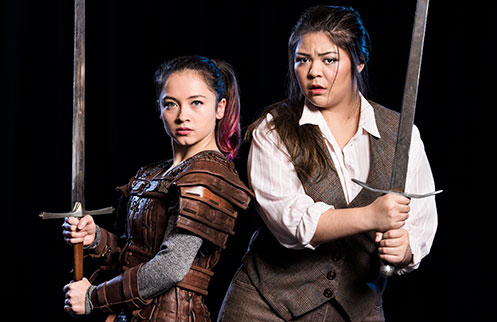
advance photos:
She Kills Monsters
L-R: Heidi Damayo, Natalie Backerman. Photo: Emily Cooper
In this high-octane dramatic comedy laden with homicidal fairies, nasty ogres, and 90’s pop culture, acclaimed playwright Qui Nguyen offers a heart-pounding homage to the geek within us all. Two years after the death of her teenage sister Tilly, Agnes Evans discovers a mysterious notebook containing her sister's home-brewed Dungeons and Dragons campaign. Newly born hero, Agnes the Ass-hatted, undertakes an epic quest to save Tilly's soul and to learn about her sister's hidden life.
Director: Keltie Forsyth; Stage Manager: Duston Baranow-Watts; Assistant Stage Manager: Evan Ren; Assistant Stage Manager: Vanessa Tang; Set Designer: Alaia Hamer; Costume Designer: Melicia Zaini; Puppet Designer: Nicolette Szabo; Lighting/Projection Designer: Stefan Zubovic; Sound Designer: Carey Dodge; Fight Directors: Mike Kovac & Ryan McNeill Bolton.
Tilly Evans: Heidi Damayo, Agnes Evans: Natalie Backerman, Chuck: Jed Weiss, Miles: Louis Lin, Kaliope/Kelly: Olivia Lang, Lilith: Shona Struthers, Orcus: Aidan Wright, Evil Gabbi: Anni Ramsay, Evil Tina: Daelyn Lester-Serafini, Farrah the Faerie: Jodi Margit, Narrator: Hannah Everett, Steve: Rafael Ruiz, Vera/Beholder: DrewAnn Carlson, Monsters: The Company.
Jan. 18 – Feb. 3, 2018, no show Sunday, Monday or Tuesday.
Preview: January 17. Opening Night Reception: January 18; Post-Show Talkback: January 24, 2018.
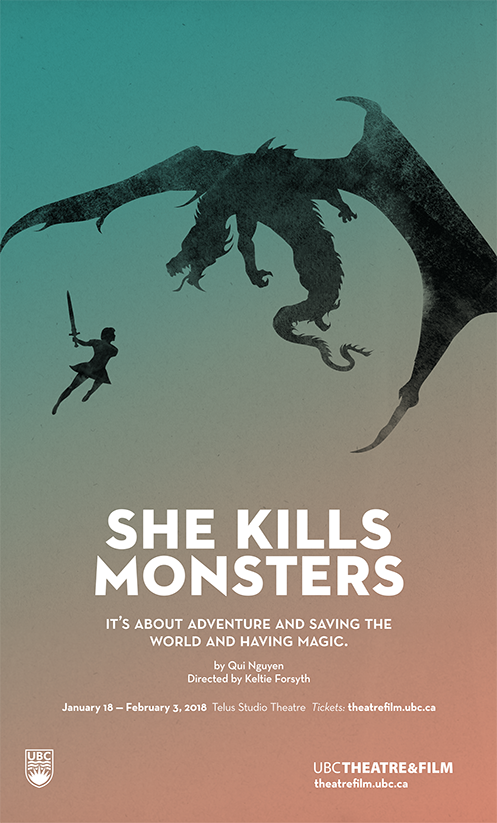
Directed by MFA Directing Alumna Keltie Forsyth
BOX OFFICE: 604.822.2678 or box.office@ubc.ca or www.ubctheatretickets.com
Media Contact:
Andrea Rabinovitch. Andrea.rabinovitch@ubc.ca
Office: 604.822.3723
Cell: 604.314.3905
Jan 18 – Feb 3, 2018
No show Sunday, Monday or Tuesday
Preview: Jan 17, 2018
Opening Night Reception: Jan 18, 2018
Post-Show Talkback: Jan 24, 2018.
Telus Studio Theatre
Chan Centre for the Performing Arts
6265 Crescent Rd
University of British Columbia, Vancouver, CANADA
Wayfinding: http://www.maps.ubc.ca
Adult: $24.50
Seniors: $16.50
Students: $11.50
Youth: $5
604.822.2678 or box.office@ubc.ca or www.ubctheatretickets.com
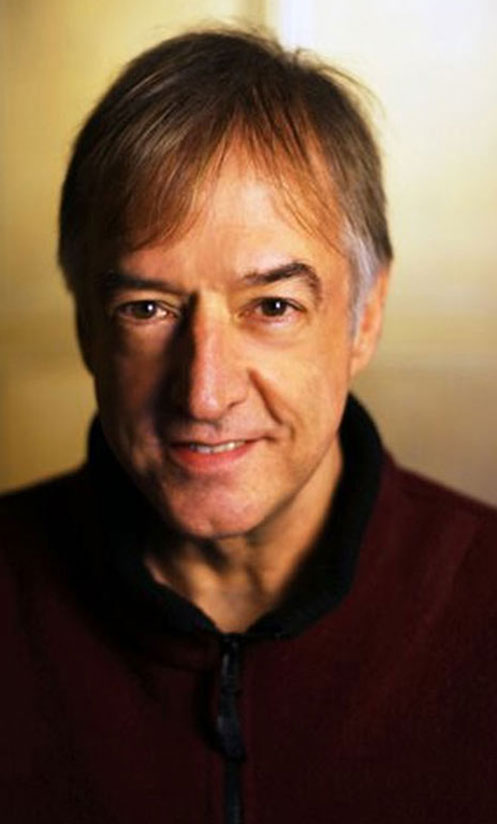
The world is full of monsters and they come in all shapes and sizes. They might be physical, they might be a bad or dangerous habit, they might even be an overwhelming urge. They can appear when you least expect them, they can show up in our dreams, they can materialize out of thin air. A monster is defined as anything so ugly as to frighten people, and our fears are as unique to each of us as our fingerprints. And most monsters require conquering, or at least a good showdown.
The monster has been a favourite trope in theatre, film and literature forever. Consider the monster created by Dr. Frankenstein. Or the Minotaur of the Greeks. Or Smaug, who guarded the ring. They are all entities that were frightening but had to either be vanquished or, at least, confronted. Through addressing the monster in some fashion, the hero is allowed to move ahead in her/his life.
In She Kills Monsters, Agnes has a showdown with the monster that represents all the things that she never knew about her sister Tilly. There is a reason that the things we perform are called “plays” and this “play” does double duty in that it is only through the creativity of playing Dungeons and Dragons that Agnes is allowed to confront her monsters (and Tilly’s). I am always delighted when we can look to creativity as a way to solve problems, whether they are universal or intensely private. I invite you to play along with all the emerging artists who have prepared She Kills Monsters for you.
There are many more adventures awaiting us on the calendar of the busiest department on the UBC campus. Naked Cinema IV will be presented at the Vancity Cinema on January 29. The Crucible will take us back to the Frederic Wood Theatre in March, and the Persistence of Vision Festival will present 20 first run short films from our BFA Filmmakers at the end of April.
All the best for 2018,
Stephen Heatley
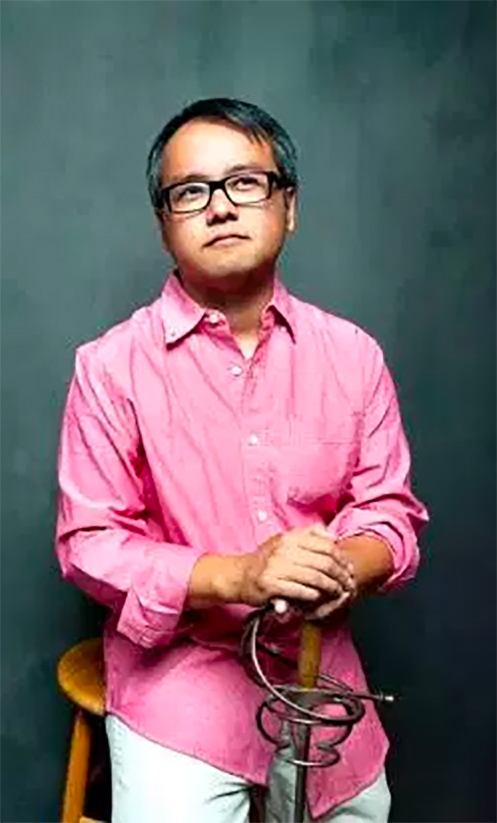
Qui Nguyen is a playwright, TV/Film writer, and Co-Founder of the OBIE Award-winning Vampire Cowboys of NYC. His work, known for its innovative use of pop-culture, stage violence, puppetry, and multimedia, has been lauded as "Culturally Savvy Comedy" by The New York Times, "Tour de Force Theatre" by Time Out New York, and “Infectious Fun” by Variety.
Scripts include Vietgone (2016 Steinberg Award, 2016 LADCC Ted Schmidt New Play Award, 2016 Kennedy Prize Finalist); She Kills Monsters (2013 AATE Distinguished Play Award, 2012 GLAAD Media Award nom); War is F**king Awesome (Frederick Loewe Award); Soul Samurai (2009 GLAAD Media Award nom); Begets: Fall of a High School Ronin; Krunk Fu Battle Battle; Bike Wreck; Aliens vs Cheerleaders; and the critically acclaimed Vampire Cowboys productions of The Inexplicable Redemption of Agent G, Six Rounds of Vengeance, Alice in Slasherland, Fight Girl Battle World, Men of Steel, and Living Dead in Denmark.
For TV, Qui's written for PBS's Peg+Cat and SYFY's Incorporated. He currently writes for Marvel Studios.
Notable honors include a 2016 Daytime Emmy Award for Outstanding Writing in a Preschool Animated Program (Peg+Cat), a 2015 NY Community Trust Helen Merrill Playwriting Award, and a 2014 Sundance Institute/Time Warner Fellowship. He's currently working on new plays for South Coast Rep/Manhattan Theatre Club (The Vietgone Saga), The Atlantic, and Oregon Shakespeare Festival (Kieu).
He is a proud member of the WGA, The Dramatists Guild, The Playwrights Center, Ensemble Studio Theatre, The Ma-Yi Writers Lab and an alumnus of New Dramatists and Youngblood.
His company, Vampire Cowboys, often credited for being the pioneers of "geek theatre", holds the unique distinction of being the first and currently only professional theatre organization to be officially sponsored by NY Comic Con.
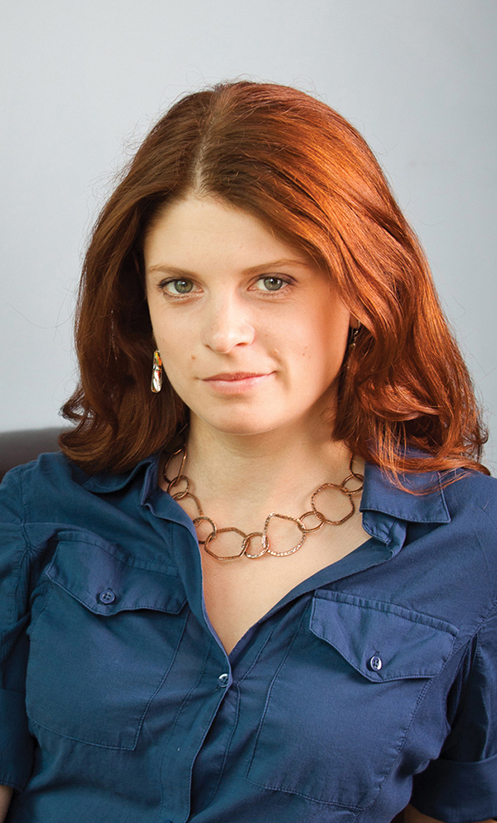
Dungeons and Dragons is having a renaissance. Buy me a glass of wine and ask me why, and I’ll talk your ear off. It may be because my generation – the generation who grew up in the 1990s when this play is set – not only grew up playing games but expected those games to grow up with us. We still play: video games, phone games, board games and yes, tabletop role playing games like Dungeons and Dragons. In the theatre, our work depends on our ability to play, and the skills required to bring an imaginary world to life are the more of less the same whether on a stage or aound a D&D table.
Like theatre, D&D also has a misogynist and racist history. The particular edition of D&D played in this text not only put a lower cap on a female character’s strength than a man’s, but it also depicted all human and humanoid characters as Caucasian. In its most recent edition, D&D has evolved to embrace diversity of gender, sexual orientation and race. But, like in theatre, in practice men still do most of the fighting.
One of the remarkable things about She Kills Monsters is that it makes space for women to be badass on stage in ways we rarely get to see. Like theatre, D&D is a space that has been claimed by outsiders despite its history. It is a place where queer communities, communities of colour and many others who don’t always fit into the norm can take space. This play foregrounds the story of a teenage lesbian Dungeon Master in a time and place when being queer, female and a geek made you a target and a freak.
This play celebrates imagination as a means of empowerment and gives the mostly female cast a chance to show their strength. It is unique in its unapologetic celebration of how imagination can empower the powerless, as was recently articulated – much better than I could – by one of the remarkable young women in the cast: “I get to come here every morning and do this play. We talk about empowerment but doing this, I actually feel it.”
I owe a huge thank you to the people who made this play possible: the fight choreographers Mike Kovac and Ryan McNeill Bolton who made it spectacular; the production team at UBC: Borja, Keith, Jim, Jodi, Lynn and Brad, who brought the fantasy to life; the designers who never stopped pushing for bigger, better, cooler; and the faculty who always offer remarkable support. My deepest gratitude to the cast and crew, who have quite literally fought to make this show badass, and to my family, who are my source of strength. Finally, I have to thank my tabletop gaming friends, Ayla, Jalyn, Patrick, Francis and especially Lester (the person who introduced me to D&D) for sharing their love of the game with us!
This year, 2017, has shown through various social and political shakeups and corresponding movements that the struggles of women1 seeking gender equality are far from settled. The year began with the Women’s Marches, one of the largest one day political actions in human history. As the year went on, the #metoo campaign used social media to show the omnipresence of sexual harassment and assault faced by women and a depressing cavalcade of celebrities, tastemakers and politicos were publicly shamed for previous misogynistic assaults and gender discriminatory behaviour.
All of these events make She Kills Monsters a timely production highlighting the themes of female empowerment, acceptance and practicing self-love in the face of social adversity. What makes Tilly’s foray into, acceptance within and mastery of the world of Dungeons and Dragons (D&D) in the mid-1990’s extraordinary is that as a closeted lesbian girl, she was entering a world within geekdom in which her gender and sexuality marked her as an outsider among outsiders. The imaginary worlds she created and used as a refuge from the harsh realities of the high school social scene are in fact part of a much larger social phenomenon of regressive behaviour and thinking currently playing out in the various pockets of geek community today.
The “Geek” subculture is a fascinating one, moving at times in and out of the mainstream and prone to the same social pitfalls of any self-identified community. Psychologists McCain, Gentile and Campbell investigated the early use of the terms “geek” and “nerd” citing usage as early as the 1950’s to describe social outcasts in the school setting where “nerds were considered to be socially awkward and overly intellectual, whereas geeks were prone to obsessive interest in marginalized or obscure hobbies such as the Dungeons and Dragons game, comic books, and personal computing.”2 Over time, and with the rise of the personal computer, the social usefulness of these once-outcasts led to a shift in interpretation of the words “geek” and “nerd” away from pejorative slurs and the terms began to be worn as badges of honour in the many manifestations of geek culture.
As once-geeky phenomena continue to popularize and become more mainstream, particularly in media (eg. the broad popularity of Lord of the Rings, Harry Potter, HBO’s adaptation of Game of Thrones, the box office successes of superhero movies and TV shows etc.) and super-nerds verging on social demigods like Bill Gates and the late Steve Jobs wield unparalleled social and economic power, the marginal position of geeks and nerds moves ever closer to the mainstream and according to media and gender scholars Salter and Blodgett, this is forcing an ongoing renegotiation of geek identity that, for some, is not entirely healthy.
These dueling visions of geek-as-victim and geek-as-hero give rise to the hypermasculine geek, an identity forged by rejecting both feminine-marked culture and constructions as well as the traditional athletic male aesthetic…this identity’s relationship to established cultural hierarchies makes it difficult for geekdom to reconcile itself with its new dominant position in pop culture even as it remains dedicated to an identity as the outsider hero... (Salter and Blodgett vi)
The fragility of these definitions and social rules within pockets of geekdom have led to gender stereotypes played out in gaming and online forums and in shaping the expectations of male and female behavior and dress. The amped up sexuality of Tilly’s female characters is a nod to the hypersexual feminine ideal that dominates gaming, movies and television in the fantasy and Sci-Fi genres. Tilly is respected among the D&D players of both sexes in the play, but the reality is that as geek culture continues to diversify and move toward the mainstream, there is an alarming backlash resulting in controversies such as “gamergate”, the online harassment campaign against several women in the gaming industry in 2014, increasing awareness of the harassment faced by women at comic and film conventions and female producers and actors whose presence represents a shake-up of the male dominated status quo, such as the recent casting of actress Jodie Whittaker as the 13th Doctor in Doctor Who. Media scholars Salter and Blodgett sum up the challenge well: “…the only available spaces are contested and marginalized: fake geek or fan girl? Sex object or feminist bitch? For women, there’s often no answer that doesn’t lead to further pigeonhoding and silencing, and either extreme can be used as an insult or excuse for marginalization.”3
The theatre is not immune to the same types of pigeonholing for female characters and actresses. Though more complicated roles for women have increased in number in the last fifty years, female characters still tend to fall within a narrow range including mothers, ingénues, witches, victims or seductresses. However, the play you are about to enjoy celebrates a strong and powerful array of female characters rising above these narrow definitions by manipulating and mocking the stereotypes and creates space for female actors to explore complicated fight choreography and more imaginative female roles. Playwright Qui Nguyen is especially well known for his unusual female roles and action oriented material, something which makes his recent hire by Marvel Studios a source of great interest for feminist media scholars. Fighting against acts of silencing and erasure is vital and will continue to be so in the coming years as these forces within and without the geek community will no doubt continue; however, for tonight at least, you can sit back and enjoy a display of some boundary defying super geeky lady power and a rare opportunity for the women of UBC’s BFA program to play their own heroes.
1It is an oversimplification to assume that gender based violence only affects women, and men and non-binary people are also victims of sexual assault and harassment. For the purposes of brevity in this article, please consider the nuance and elasticity of terms such as “women/men” and “female/male”.
2McCain, Jessica, Brittany Gentile, and W. K. Campbell. "A Psychological Exploration of Engagement in Geek Culture." PloS One, vol. 10, no. 11, 2015.
3Salter, Anastasia, and Bridget Blodgett. Toxic Geek Masculinity in Media : Sexism, Trolling, and Identity Policing. Palgrave Macmillan, Cham, 2017.
Director: Keltie Forsyth; Stage Manager: Duston Baranow-Watts; Assistant Stage Manager: Evan Ren; Assistant Stage Manager: Vanessa Tang; Set Designer: Alaia Hamer; Costume Designer: Melicia Zaini; Puppet Designer: Nicolette Szabo; Lighting/Projection Designer: Stefan Zubovic; Sound Designer: Carey Dodge; Fight Directors: Mike Kovac & Ryan McNeill Bolton.
Tilly Evans: Heidi Damayo, Agnes Evans: Natalie Backerman, Chuck: Jed Weiss, Miles: Louis Lin, Kaliope/Kelly: Olivia Lang, Lilith: Shona Struthers, Orcus: Aidan Wright, Evil Gabbi: Anni Ramsay, Evil Tina: Daelyn Lester-Serafini, Farrah the Faerie: Jodi Margit, Narrator: Hannah Everett, Steve: Rafael Ruiz, Vera/Beholder: DrewAnn Carlson, Monsters: The Company.
Stephen Heatley Department Head
Cam Cronin Department Administrator
Ian Patton Academic Administrator
Zanna Downes Theatre and Film Production Graduate Secretary
Karen Tong Theatre and Film Studies Graduate Secretary
Borja Brown Manager, Technical Theatre Production
Jim Fergusson Stage and Lighting Specialist
Keith Smith Stage and Lighting Specialist
Lynn Burton Properties Specialist
Jodi Jacyk Head of Wardrobe, Costume Specialist
Tony Koelwyn Theatre at UBC Box Office
Andrea Rabinovitch Marketing and Communications Coordinator
Linda Fenton-Malloy Web Designer
Sarah Crauder Film Program Administrator
Stuart McFarlane Film Equipment Manager
Dmitri Lennikov, Film Collections Coordinator
CREATIVE COLLABORATORS
Jonathan Wood Graphic Designer
Emily Cooper Advance Promotional Photography
Javier Sotres Dress Rehearsal Photography